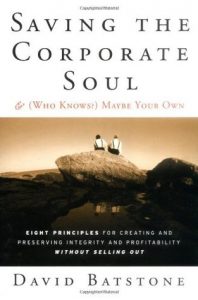 The image of corporate America has been rapidly eroding over the past years as scandal, greed and layoffs are highlighted on the evening news. In this book the author explores what it takes for a corporation to act and engage in business in a way that aligns with the values of its workers. The author proposes eight principles for a corporation to incorporate into their operations that will create an environment that not only will help it operate in a values-based way, but in most cases help it excel financially over the long haul. The author also addresses the common challenge in how to measure the results of doing “good”. Most senior managers have a desire to operate corporations with integrity and fairness, but have a difficult time justifying fairness and integrity decisions based on a measurable outcome. The author holds forth that a principled company will maintain and enhance its reputation which creates an environment much more conducive to gaining new customers. In addition, a principled company will reduce its liability exposure when it comes to lawsuits, both from a product perspective as well as from an employment perspective. Lastly a principled company will better manage the networks that it is involved in.
The image of corporate America has been rapidly eroding over the past years as scandal, greed and layoffs are highlighted on the evening news. In this book the author explores what it takes for a corporation to act and engage in business in a way that aligns with the values of its workers. The author proposes eight principles for a corporation to incorporate into their operations that will create an environment that not only will help it operate in a values-based way, but in most cases help it excel financially over the long haul. The author also addresses the common challenge in how to measure the results of doing “good”. Most senior managers have a desire to operate corporations with integrity and fairness, but have a difficult time justifying fairness and integrity decisions based on a measurable outcome. The author holds forth that a principled company will maintain and enhance its reputation which creates an environment much more conducive to gaining new customers. In addition, a principled company will reduce its liability exposure when it comes to lawsuits, both from a product perspective as well as from an employment perspective. Lastly a principled company will better manage the networks that it is involved in.
Each of the principles that are mentioned, are followed with examples of companies that are following and implementing the principles mentioned. The first principle is for the executive leadership to align their personal interests with the interest of all the stakeholders. Leadership matters in setting the direction of a corporation, but it is also critical that the top leaders also set the example from an integrity and ethical perspective. The second principle is for a company to be transparent about its operations. Each decision that is made should be able to stand up to public scrutiny. There will always be detractors, but with adequate explanation a decision should be able to make sense to the average worker of the company. The third principle is for the company to consider itself an active part of the community. As a company looks at the community as more than just an economic market, as well as being an active citizen that is interested in the wellbeing of the community, good things happen. The fourth principle is for the company to represent their products honestly and be proactive in caring for their customer. This customer care goes beyond just delivering a product and collecting a check. The fifth principle is to value and treat employees as a partner and team member in the success of the business. The sixth principle is to treat the environment as a stakeholder. The seventh principle is to strive for a diverse and balanced employee, customer and vendor base. The eighth principle is for companies that pursue international trade to be aware and sensitive to worker’s rights and justice issues in other countries.
This book was written to encourage the corporate worker to consider how he/she can use the position, talents and influence that he/she has to create an environment that allows for a sense of significance. The author puts forth antidotal evidence that a worker doesn’t have to be the CEO to affect change in a company. The author wants the reader to consider how he/she doesn’t have to feel trapped in an environment that puts his/her integrity at risk. If a worker operates within his/her own sphere with integrity and encourages the leadership of the company to follow the eight principles that were laid out then change can happen. These principles also provide a measurement tool for the worker to determine if the company he/she is working for is making progress in implementing these principles into the operations of the company. Ultimately, if the company isn’t operating with integrity in these areas, and doesn’t appear to be working toward change, then this can provide cause for the worker to begin to search for the company that is operating under these principles.
